|
Christmas-time is so often a confluence of loss and gain. So many of us find that good and tough memories are tangled up. My parents died a year ago this weekend, just as a new child was conceived in my immediate family: a child who will therefore be a new gift among us this Christmas. Yet it is hardly the first time that death and birthing have been entwined. Reflecting on that helps me better understand today’s Gospel and not least Mary’s extraordinary cry of justice, and of joy. As Alla Renee Bozarth brilliantly expresses it in her poem Annunciation, it is a cry of subversive angelic power. No wonder the three large ‘queer’ angels we will shortly welcome from Lismore’s LIghtnUp project are entitled Courage, Compassion, and Joy. For, as Lismore’s wonderful community artist Jyllie Jackson has identified, Courage, Compassion and Joy are core life-giving elements, not only to Queer Pride. They also, vitally, flow out of the Gospel and Magnificat of Mary, and, as Jyllie suggests to us, they are at the core of what the Way of Jesus, and our particular community, is and can be…
0 Comments
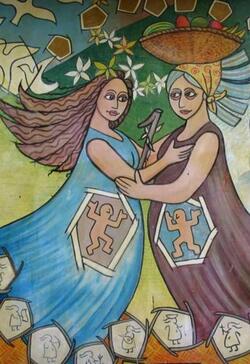 Visitación, detail from mural at Casa Ave Maria in Managua, Nicaragua Visitación, detail from mural at Casa Ave Maria in Managua, Nicaragua How do you relate to Mary in our Christian tradition? Even mentioning her name opens up a host of feelings and thoughts for so many. As the Danish literary historian Pil Dahlerup rightly said, in an article entitled ‘Rejoice, Mary’: No woman and no deity in the Middle Ages attracted the poets like the Virgin Mary, mother of Christ. It is, however, hard to read what the poets write about Mary; we are inhibited by prejudices that block our understanding of what the texts are actually saying. Protestants dislike her because she is attributed divinity. Male chauvinists dislike her because she is a woman. Feminists dislike her because she is a woman in a way of which they disapprove. Nationalists dislike her because she represents an alien element in terms of creed and idiom. Marxists dislike her because they do not see her (in the North) as a figure of the people… Despite this, we cannot avoid Mary in Christian faith. Not least, although women and their lives and gifts are so few and highly gendered in the Bible, Mary simply cannot be erased. So what do we make of her today?...  a shared reflection and invitation by Josephine Inkpin (J) & Penny Jones (P)... (P) We‘ve just heard two different accounts of Jesus’ resurrection, haven’t we?! (Mark 16.1-8 and John 20.1-18) So what we do make of that – and all the other resurrection accounts which cannot be simply conflated? More importantly, what does Resurrection mean to us – to you, to me, to all of us together? That is not a question which can be answered in a few minutes of Reflection. Jo and I have therefore decided to open up a dialogue, which we hope will encourage us all to share in the days ahead. For one thing which is absolutely clear about Jesus’ resurrection of is that it is related through a multiplicity of stories and symbols. These come from different people and biblical outlooks and they thereby also invite us to share our own experiences and insights into Resurrection. For Resurrection is an extraordinary reality we celebrate today. Yet it is not a simple ‘fact’, is it Jo? Isn’t it rather an invitation to see, and travel into, deeper experience, deeper love, and deeper mystery?… 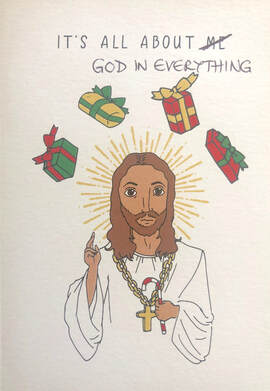 One of the Christmas cards that struck my eye this year was one that has a picture of a Jesus figure on the front, accompanied by presents around their head, and the proclamation ‘It’s All About Me’. What do you think about that? I suspect that it is a gentle way of poking fun at both the tendency of some Christians to be somewhat sanctimonious about ‘possession’ of our end of year communal festivities, and also the way in which we often want Christmas to meet our own expectations. This often begins as children - doesn’t it? – when we human beings don’t quite receive the magical Christmas for which we were hoping: maybe when we don’t have quite the special present we were expecting; and/or when our Christmas meal, or worship, isn’t quite right, or too much; or when we, or others around us, aren’t able to maintain the proverbial spirit of peace and goodwill in all our interactions. Sometimes our expectations are just too much, or too unrealistic. Sometimes they are quite right, and we are let down by events or by others. Either way, we may feel a little betrayed, especially if hopes for ourselves are involved. Perhaps however, in the disappointments of our personal Christmases, we may still learn a little of the wisdom in the birth of Christ. Fresh light may then stream in, particularly when we start looking beyond ourselves – not simply to the Christ child, but to everything about them. This may be part of the learning of this Covid-19 year, in which many Christmases are not as the world as a whole would hope. For, like the first Christmas, pictured in various ways in the Gospels, we have had to learn that it is not ‘All About Me’. If God is among us – the central message of Christmas – then he/she/they are everywhere, but not as we expected, and all of us are, truly, ‘in this together’… 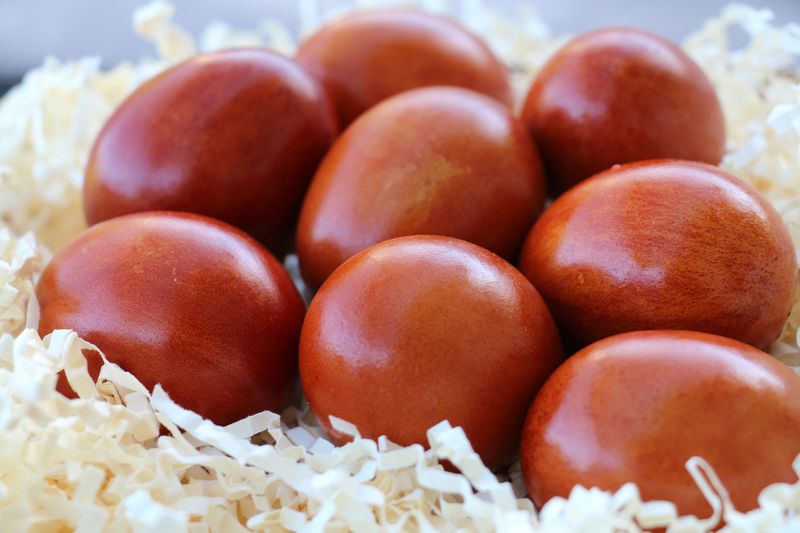 When you see an egg, do you see the risen Jesus? This is what Christians have done from the earliest times. There is an Armenian picture from the eleventh century that shows the angel and the women at the tomb with a huge egg inscribed with the words ‘He is not here. He is risen.’ So why an egg. Well firstly eggs are elliptical in shape – they are infinite, having no beginning or end, and so are symbolic for God. There is no end to God’s creativity, God’s love, God’s compassion. Secondly an egg symbolizes the potential of new life. In some sense it is a microcosm, a miniature version of everything that is. It reminds us of the potential that each of us has for new life and a new beginning, today on Easter Day and every day. Thirdly, for a chick to emerge from an egg, the shell must be broken. This symbolizes for Christians the rolling away of the stone from the front of the tomb, so that the risen Christ could emerge. It reminds us that for the new to come, the old has to be fractured and let go – an important message in these days, where so much of what is familiar to us has to be left behind. Eggs tell us that God cannot be contained; that resurrection is possible and life is stronger than death. In recent memory Christians living under the severely repressive Albanian government, used to dye eggs red for the blood of Christ in the Orthodox fashion, and then take them out in the dark of Holy Saturday night and place them on the steps of town halls and places of government. By doing so they asserted the power of love over hate. So, what do you see when you see an egg? Take a little time today to contemplate an egg and ask God to help you see there the reality of new life even in the midst of death. And look twice – for it can be a messenger of hope and resurrection to you today. Penny Jones, for Easter Sunday 12 April 2020 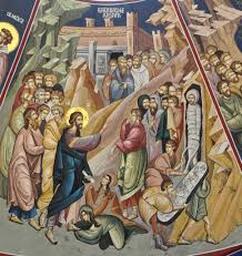 Our Gospel reading today (John 11.1-45) is the extraordinary story of the raising of Lazarus – a story of resurrection not just for the future, but into every day, earthly material life. I want us to concentrate on the three commands that Jesus gives in this story. Over the coming week you might like to ponder each in turn for a couple of days, and see how God speaks to you and the circumstances of your life through each one. The three commands are these: Take away the stone Come out Unbind him and let him go...  Making a transition is rarely easy, is it? Currently I’m conscious of many changes in which I am involved, some of which will take much time, wisdom and energy to unfold. We are, of course, in the very midst of such a change this morning, as Penny and I lay down our callings here, and as all of us open ourselves to the new things that God will do with us in the future. As such, this is a special, and precious, moment, as all holy transitions are. For the test, and the fruit, of God’s love is often found where we experience change. After all, as we see again, strikingly, in our Gospel reading today, our God is a God of a new creation, always calling us forth into new life and growth. Like John the Baptist, some of us are called to let go and pass on the baton. Like the disciples we are all called to ‘come and see’ where Jesus is calling us. Like Simon, we may be called to new names and purposes. Don’t you agree Penny?... Many years ago I ministered with a wonderful older couple. Let us call them Bill and Beryl. They were faithful Christians and stalwarts of our church, and, among other things, I remember their 60th wedding anniversary celebration which brought terrific joy to everyone. Like all of us however they had their quirks, some more endearing than others. As they grew older, for example, they grew less able to come to worship and I began to visit them to share holy communion at home. Each time I visited they would have created a huge feast of salad and salmon sandwiches, none of which they ate but all of which they felt I should consume. Such are the perils of pastoral visiting! Indeed, Beryl also had a huge cupboard which was full of massive quantities of tinned salmon, various assortments of which she always insist on giving me when I tried to leave. Was that an addictive practice, I wonder? Was her salmon hoarding perhaps also a reflection of growing up in days of scarcity and rationing on Tyneside, always, to this day, an economically poor an challenged region of England? I never quite found out, for what concerned me more was Beryl’s often unhealthy attachment to the physical and pyschological wounds in her life, and her frequent inability to respond – like the man in our Gospel story – to Jesus’ call to ‘stand up, take your mat, and walk’...
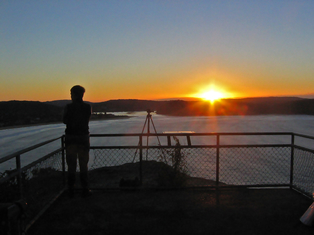 I want to speak about three things which jump out from our Gospel reading today. I want to speak about fish, faith and forgiveness: about how fish flow out from faith; about how faith flows from forgiveness; and about how forgiveness flows from being a fish. First of all however, let me ask a question: where do you picture today’s Gospel story happening? What kind of a boat is it that sets out fishing? What do the people in the boat and on the shore look like? And what does the beach look like to you? Let us close our eyes for a moment and see if we can picture those elements of our story in our mind’s eye. Maybe we can also hear the sounds, and the smells, of the beach and the sea, the movement of the boat and the waves, the crackle of the fire, the voices of Jesus and the disciples. Let us stop for a moment and try to see, and feel… I have a good friend called Peter Millar who was recently diagnosed with bone cancer. Some of you may remember him, for he visited Toowoomba a few years ago and he is quite a tour de force! Some of you may also know him from his writings. For Peter Millar is a leading member of the Iona Community in Scotland and a former Warden of Iona Abbey and he has contributed prolifically to sharing contemporary faith and engaged spirituality through many books, articles, poems and prayers. Like many contemporary Celtic Christians, he has also woven together a deep life of prayer and faith with commitment to building community locally and across the world, especially with the poor and the marginalised, and the struggles of the wider environment. Most of all, I think, Peter is an amazing person and model of encouragement for so many people, So it is particularly sad to see such personal struggles afflict such a spiritual live-wire, aflame with the love of God. Yet perhaps this is where, as in the sufferings and cross of Jesus, the love of God really comes alive and shines forth its truth….
|
Authors
sermons and reflections from Penny Jones & Josephine Inkpin, a same gender married Anglican clergy couple serving with the Uniting Church in Sydney Archives
June 2024
Categories
All
|
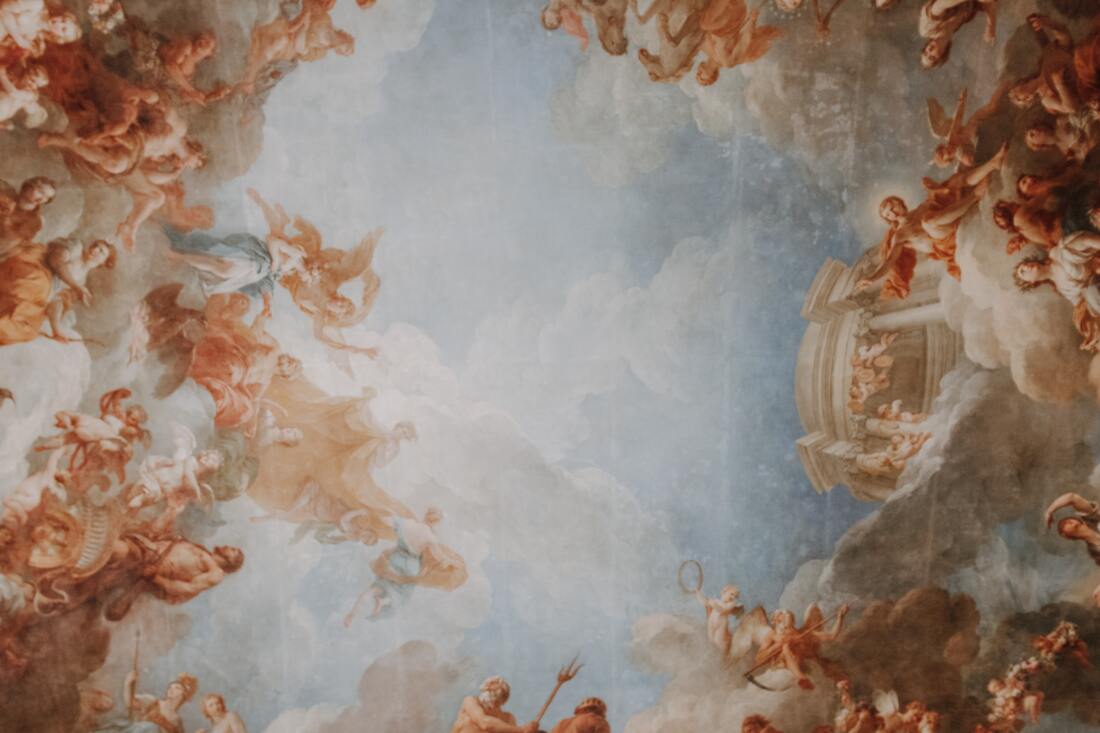
 RSS Feed
RSS Feed